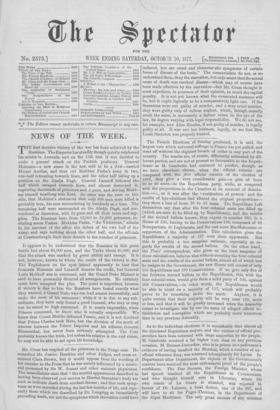The French Elections of Sunday produced, it is said, the
largest vote which universal suffrage in France has yet polled, and went off without the slightest breach of order in any part of the country. The results are, of course, differently estimated by dif- ferent parties, and are not at present so favourable to the Repub- licans as M. Gambetta had ventured to predict, though, as we have elsewhere shown, when the official returns are compared with the first official returns of the election of 1876, they give a very considerable gain—a gain of from 30 to 40 seats—to the Republican party, while, as compared with the proportions in the Chamber at its moment of dissolu- tion—i.e., as it was after the verification of powers' and the results of bye-elections had altered the original proportions— they show a loss of from 30 to 40 seats. The Republican Left themselves say that after the four colonial seats are filled up (which are sure to be filled up by Republicans), and the results of the second ballots known, they expect to number 335, in a House of 533, leaving to the Conservatives 198, composed of 90 Bonapartists, 40 Legitimists, and the rest mere MacMahoniets or supporters of the Administration. This calculation gives the Republicans a majority of 137 over their opponents. But this is probably a too sanguine estimate, especially as re- gards the results of the second ballots. On the other hand, the Times' correspondent, who gives us the least sanguine of these calculations, believes that without counting the four colonial seats and the results of the second ballots, almost all of which last he assigns to the Government, the new House will consist of only 316 Republicans and 199 Conservatives. If we give only five of the fourteen second ballots to the Republicans, this, with the four colonial seats, would give them a solid party of 325, against 208 Conservatives,—in other words, the Republicans would be able to count on a majority of 117, which will probably prove to be something under the mark. Anyhow, it is quite certain that their majority will be very near 120, more or less, and that it will be greatly increased when the Assembly comes to investigate one by one the cases of alleged official in- timidation and corruption which are probably more numerous than in any previous ARbvimbly.


































